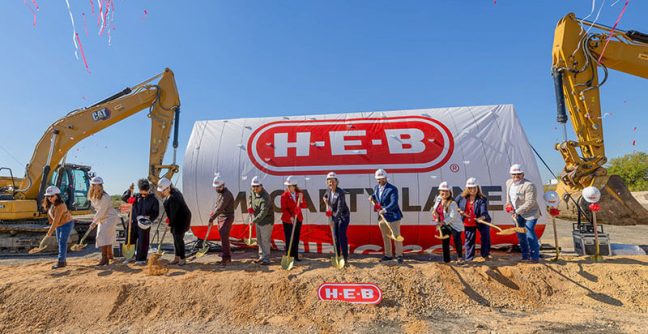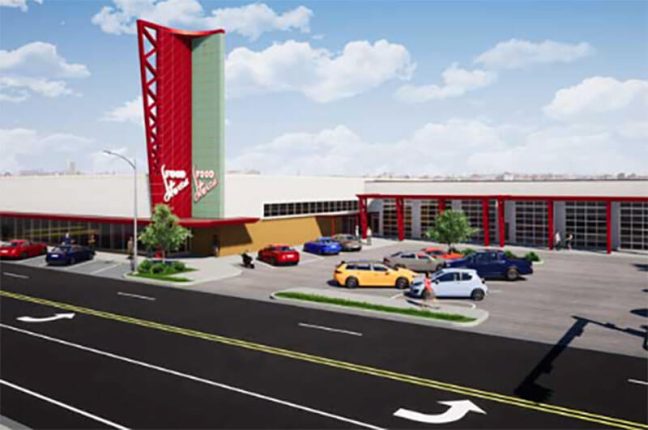Thirty counties in Central Texas remain disaster areas following the catastrophic flooding from rains that began to fall July 2. Flood waters rose from about 3 feet to 30 feet in just a few hours, leading to the loss of 25 girls and two counselors at Camp Mystic in Hunt, Texas, on the Guadalupe River, before sunrise on July 4. As of mid-October, one camper remained missing.
Gov. Greg Abbott in September signed a law that requires local Texas governments to install outdoor sirens and warning systems in flood-prone areas. In October, Abbott renewed the flooding disaster proclamation for the 30 counties, authorizing the use of “all available resources of state government and of political subdivisions that are reasonably necessary to cope with this disaster.”
A total of 118 people lost their lives as a result of the flooding.
Area food retailers largely escaped flood damage, and many of them, as well as grocers across the country, rendered their aid.
San Antonio-based H-E-B, the Butt family and the H.E. Butt Foundation gave $5 million in funding to nonprofits serving the communities most in need. In addition, H-E-B provided on-the-ground meals, volunteers, product and support to impacted areas.
Long-term relationships within the hard-hit communities of Bandera, Comfort, Canyon Lake, Lago Vista, Junction, San Saba, Llano and San Angelo made it possible for Lowe’s Markets to quickly get food, water, paper products, disinfectant and hygiene kits to where they were needed.
Affiliated Foods Inc., the wholesale distributor for Lowe’s, drove numerous truckloads of water and food to the seven stores. In many cases, the truck orders came straight from Roger Lowe, CEO of Lowe’s, and Randy Arceneaux, president and CEO of AFI. Everyone at every level was involved.
Lubbock-based The United Family conducted a companywide register campaign for flood relief, with all proceeds going to support the efforts of the San Angelo Area Foundation and Community Foundation of the Texas Hill Country’s Kerr County Flood Relief Fund.
In addition to running the campaign across all its Texas and New Mexico locations, The United Family made a lead gift of $10,000. Ultimately, United along with the Southern Division of its parent company, Albertsons, donated $487,366 to the fund.
Fort Worth-based convenience store chain Yesway announced in mid-August that it had raised $200,000 to support Texas Hill Country communities impacted by the devastating floods, far surpassing its fundraising goal.
Yesway and Allsup’s customers, employees and supplier partners contributed to the effort, according to Yesway Chairman, President and CEO Tom Trkla.

Gary Huddleston, grocery industry consultant for the Texas Retailers Association, commended the USDA and Texas Department of Health and Human Services for approving a hot food waiver for Supplemental Nutrition Assistance Program recipients in record time.
“We were extremely appreciative” of the swift decision, he said, noting that sometimes the approval has come after the crisis has passed.
The waiver allowed people with SNAP benefits to use them to buy hot foods from grocery stores.
“The thought being that they’ve lost their kitchens and they can’t cook anything, so they can come in and get a rotisserie chicken or a hot meal from a grocery store,” he said.
SNAP waiver coming next spring
Speaking of SNAP, benefits recipients in Texas will not be able to use their benefits to purchase sweetened drinks and candy, effective April 1.
Gov. Abbott and the Texas Department of Health and Human Services requested the waiver June 26, and it was approved by the Food and Nutrition Service (FNS) Aug. 4. It will be in effect for two years, allowing the FNS to evaluate how the change affects SNAP participants and retailers.
Food retailers, especially smaller ones, likely will encounter some challenges with the exclusions, Huddleston said.
“Certainly, we’re going to follow the SNAP rules, but it does create some difficulties, especially for smaller retailers trying to use technology to ‘block’ the restricted products from the system,” he said.
Larger retailers that operate across multiple states also will encounter issues.
“What would have been helpful is if, rather than definitions, the grocers had been given a list by UPC code of the restricted products and would make implementation 1) cheaper, 2) faster and 3) more accurate.
“But unfortunately, at least in the state of Texas and most other states, they’re saying that they don’t have the staffing to put together the list by UPC code,” Huddleston said.
One advantage for Texas in implementing the waiver is that several other states’ waivers go into effect Jan. 1. Their experiences could allow Texas “maybe some time to do some course correction,” he noted.
Grocers on the grow
Growth and change are afoot in the grocery market in Central Texas. San Antonio-based H-E-B has had a good bit of store activity in the area this year. Most recently, the grocer broke ground on its third store in San Marcos, near Austin. The 114,000-square-foot location at I-35 and McCarty Lane will include the city’s first True Texas BBQ restaurant. Indoor seating will be offered.

“We are always looking for growth opportunities to better serve our customers. This is a project we have had in the works for years, and we look forward to serving even more customers in this growing part of Texas with the best H-E-B has to offer,” said Cathy Harm, SVP-Central Texas Region for H-E-B.
The company says the store will provide customers with an expansive product selection along with services and features, including pharmacy drive-thru service, curbside with dedicated parking and home delivery, and an H-E-B Fresh Bites convenience store with fuel station and car wash.
It is expected to open around fall 2026.
On Oct. 22, a new store opened in Manor, the first H-E-B for the city, which lies east of Austin.
The 101,000-square-foot store is located at 13100 N FM 973. Its fresh departments are complemented by a wide array of grocery items as well as several general merchandise departments.
In September, H-E-B opened its third store in Georgetown.
The 112,000-square-foot location at Ronald Reagan Boulevard and Ranch Road 2338 in the Parmer Ranch community is “filled with amenities and unique departments that H-E-B is known for,” the grocer said.
“For nearly 60 years, we’ve been proud to serve the Georgetown community, and now Texans in this growing area can enjoy a store that offers the very best of H-E-B,” Harm said.
With a distinct exterior design, the store also incorporates environmental sustainability design elements and energy-efficient features, such as CO2 refrigeration units and LED lighting, the grocer said.
It joined the Wolf Lakes Village and Williams Drive H-E-Bs operating in Georgetown.

In August, the H-E-B serving communities near the University of Texas-San Antonio campus opened. The 111,000-square-foot College Park store is located at 7330 N Loop 1604 West.
“Along with commitment to top-quality service and selection, our H-E-B Partners are excited to serve this dynamic community and our UTSA Roadrunner neighbors,” said Jar Vasquez, general manager.
Meanwhile, a historic former H-E-B in downtown Waco is awaiting its new grocery tenant.
Called Garden City Grocery, the store will focus on local farm partnerships, clean ingredients and affordable fresh food, according to the store’s website, gardencitywaco.com.
Garden City says the store in the heart of downtown Waco will blend “vintage charm with timeless values.” It will have a greenhouse and scratch kitchen and will host family events such as meet-the-farmer days, school field trips and scratch-cooking classes (such as baking fresh sourdough from grinding wheat berries).
A grocery store has not operated in the space for 70 years, due to the Waco Tornado, according to Garden City Grocery, which said the team behind the store includes grocers from family-owned neighborhood stores in Austin, locals, Cadence Bank and urban developer Anthem Group.

They are coming together “to revive what was once the ‘finest’ of all 53 H-E-B locations at the time with ‘the tallest of any grocery sign in the state,’” according to the website.
The name comes from the original Garden – Eden – “where provisions and farming all began,” the grocer says.
The website further describes the store: “Garden City provides affordable and quality essentials easily accessible to all. Enjoy nostalgic terrazzo floors with natural light pouring in through atrium windows and breeze-blocks, where you can daily peruse our meat market, or exclusive wines from shop neighbor Mayfield Selections, and our in-store ‘Refresh Bar,’ a fresh take on the original ice cream fountain on the same site, offering a variety of fresh-squeezed juices, kombucha on draft, smoothies and local coffees.
“Focused on ‘less is more,’ seasonality, ‘food you can trust’ and long-range cost-partnering with nearby farms and ranches ensures more folks can simply ‘eat well’ and afford what we call a higher nutritional value per dollar.”
The parking lot will offer “10-ish minute ‘Grab ‘N Gro’” spaces for those wanting to pop by for basics or chef-made meals-to-share.
The store is on Austin Avenue, one mile from Baylor University, and will help eliminate a “long-standing 2-mile-wide USDA food desert.”
No opening date has been provided, but this winter or next spring are possible, the grocer said.
The space will have some efficiency apartments as well as “pocket” retail spaces for other businesses.
Sprouts Farmers Market plans to open a new store in New Braunfels, between Austin and San Antonio, on Jan. 23. A hiring event is scheduled for Dec. 11 to fill 92 full- and part-time positions for the store at 275 Creekside Crossing.
The Phoenix, Arizona-based grocer currently operates 61 stores in Texas. During its third quarter earnings call Oct. 29, Sprouts CEO Jack Sinclair, in response to an analyst’s question about competition and pricing, said, “We watch our prices … we watch produce pricing more attentively than anything else, and Texas has become a more aggressive market with H-E-B’s expansion into Dallas.
“We’re having a great time opening new stores,” Sinclair continued. “I’m delighted with our Dallas performance alongside H-E-B; we’re doing really well in terms of how those new stores are opening, and we’re having success in San Antonio and Austin as well.”
On Oct. 10, Sprouts opened a new store at 150 Heroes Memorial Drive in Kyle, an Austin suburb.
“For years, there has been a vision for the Brick and Mortar District to be a vibrant, walkable hub for shopping, dining and community life,” said Kyle Mayor Travis Mitchell. “The opening of Sprouts Farmers Market is the first major step in bringing that vision to reality.”
Pan-Asia Supermarket expects to open its first store in Texas, in San Antonio, next year. The grocer debuted in Omaha, Nebraska, in 2010 and has since opened locations in Overland Park, Kansas (two stores); Manchester, Missouri; Tulsa, Oklahoma; and the latest, in Milwaukee, Wisconsin, which opened in July.
A Nashville, Tennessee, store is expected to open this winter, followed by the San Antonio store sometime in 2026.
According to the company’s website, it carries more than 10,000 Asian products, including vegetables, fruit, seafood, meat and grocery products. Chinese, Vietnamese, Korean, Japanese, Thai, Filipino, Indian, Pakistani, Indonesian, Malaysian, Burmese, Laotian, Singaporean, Hmong and Cambodian products are on the shelves.
Natural Grocers shut down its Arbor Walk store in Austin in September after it was unable to negotiate a lease renewal. But the Lakewood, Colorado-based grocer continues to operate three other stores in Austin as well as stores in Temple and Waco to serve area customers.
Another store closing will take place in Austin at the end of next year. The Guadalupe location of Wheatsville Food Co-op will shut down Dec. 31, 2026, when its current lease expires. The co-op’s location on South Lamar will continue to operate.
This summer, Wheatsville had embarked on a plan to purchase two Fresh Plus stores in Austin, on 43rd Street and on Anderson Lane. However, according to a statement on the Wheatsville website, “After our period of due diligence, we determined that the project was no longer a financially viable endeavor. As responsible stewards of the co-op’s assets, choosing not to move forward is in the best interests of Wheatsville’s long-term success and our ability to serve the greater Austin community.”
Wheatsville Food Co-op was founded in 1976.
[RELATED: Led by Lone Star State, Southwestern U.S. Ripe For Grocers]

